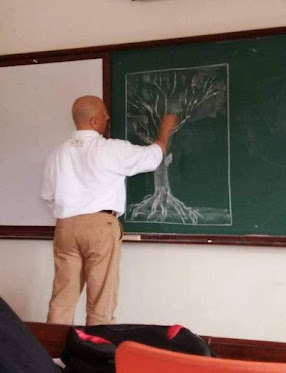Nature Wisdom (ప్రకృతి జ్ఞానం) (T/E 28.04.2023)
EnTREE ⚛️ 🪷🌳 కల్పవృక్షము ప్రకృతి - జ్ఞానం "ప్రకృతి అందాన్ని చూసి ఆస్వాధించే మనసు ఉన్నప్పుడు ఆ ప్రకృతి ఎంతో అద్భుతంగా ఉంటుం ది " ప్రకృతి రహస్యాలను అన్వేషించడానికి మనకు ఉన్న మూల సాధనాలు జ్ఞానేంద్రియాలు, ఇవి మనకు అనుభవాన్ని కలిగిస్తు ఉన్నాయి. ఈ అనుభవం లొ బుద్ధి కొన్ని సత్యాన్ని ప్రతిపాదిస్తూ ఉంటుంది. ప్రకృతి ధర్మలను వివిధ మాధ్యమాల ద్వార గ్రహించిన తరువాత వాటిని మనకు అనుకూలంగా మార్చుకోగలుగుతున్నాము. ఉదా: చెయ్యి పెడితే కాల్చే నిప్పును, చలి నుంచి రక్షించుకోవాడానికి వాడుతున్నాము. ఇంద్రియ జ్ఞానానికి గల హద్దులను శాస్త్రవేత్తలు/తత్వవేత్తలు తెలుసుకున్నారు. ఇంద్రియ జ్ఞానం మీదనే ఆధారపడి ఉంటే ఈనాడ విద్యుచ్ఛక్తి మెదలైన శక్తులు ఉండేవి కావు. ఆకాశం లొ (సృష్టిలో) ఏఏ పదార్ధలు ఉన్నాయో తెలిసేది కాదు. ఇంద్రియ జ్ఞానాన్ని విస్తరింపడానికి శాస్త్రజ్ఞులు/తత్వవేత్తలు అనేక వేల సాధనాలను కల్పించారు. శాస్త్ర జ్ఞానం/ఆధ్యాత్మిక జ్ఞానం ఇంతగా అభివృద్ధి అయిందంటే శాస్త్రజ్ఞులు, తత్వవేత్తలు కొన్ని నియమాలను విధిగా పాటించారు. విధి నిర్వహణ సమయంలో ఆ నియమాలు జ్ఞానానికి సంకెళ్ళుగా మారాయి, ...
